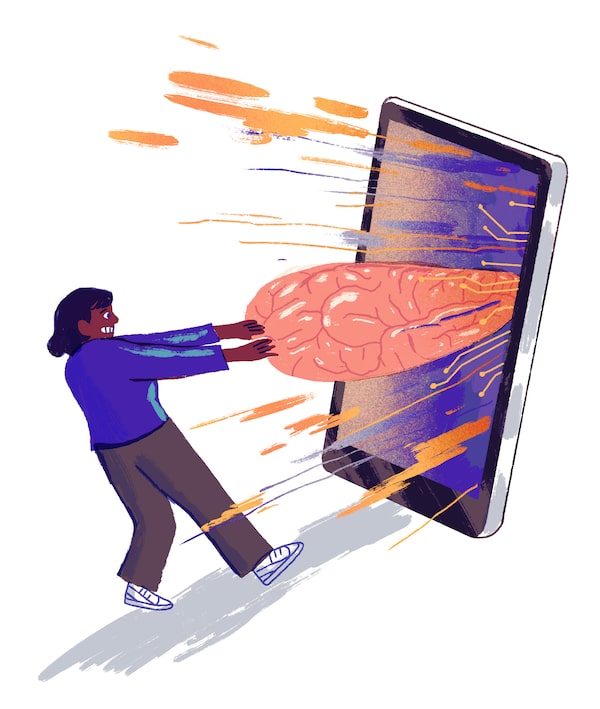First Person is a daily personal piece submitted by readers. Have a story to tell? See our guidelines at tgam.ca/essayguide.

Illustration by Drew Shannon
Dear Mind,
I am not a robot. Ha ha ha, that cracks me up! But seriously, how could you have let this happen?
How were you not aware that you were changing, that your former autonomy had been compromised, that you had become dependent, entangled even, with technology?
You’ve always been strong, independent in thought and action, emotionally stable.
Now, when the technology fails, you falter.
As a cautiously late adopter of digital technologies, you scoffed at early social-media adopters: “Nothing is free,” you’d say. You still refuse to update your phone, that indestructible Nokia, a decade old and dropped on its head many times, and though its 3G network is shrivelling up, and two-factor identification is impossible, you cherish it.
At least it isn’t a flip phone. Even you would laugh at that!
But listen, I was really worried about you in May when that wretched derecho tore through Ottawa. The internet was down for nine days, and I saw you isolated in a way I had never seen before. You worried about being disconnected from the world, about messages arriving, with no way to know, and no way to let the senders know you had no service. No streaming, no research, no shopping, no connecting.
You called the handful of friends who still use the phone for chat. You turned on the radio to forage for news. You read books, went for walks, listened to music. But there was no compensation for the anxious melancholy you suffered, severed from your electronic memory, your library, your service provider and your doorway to the world.
I remember us working more as a team, before technology came between us. We were very elastic then. Remember our first teaching job when we were asked to coach volleyball and teach the introduction to computer course in that small Northern Ontario town? Two things we didn’t have a clue about, but we found our way through. You were always a quick study and I had the strength and resilience to keep us going.
Now I watch you burdened by the daily cognitive load of working entirely through technology, your days filled with statements such as “You’re on mute,” or “I’ll turn my camera off, maybe that will help,” or, “The network must be slow today.” You used to be so dynamic, but now you seem depleted.
Then in late June when your work phone died and your laptop operating system slowed to a crawl. You were spinning your wheels, acrid smoke rising from them, because you could not be productive. “There is no other way for me to get work done,” you lashed out at your neurons.
Where was your elasticity then? You had lost the ability to find workarounds. You had forgotten the lessons of diversification and the hazards of monoculture.
The situation escalated further with last weekend’s incident when your amygdala imploded.
It happened while you were attempting to log into your account with the Canada Revenue Agency to read an e-mail they said they had sent. You jumped through hoop after hoop, answered question after question, identified the number of images with planes twice and still you failed to access that e-mail. You started to cry, reduced to a frustrated soup of overwhelm. Defeated by multifactor authentication, there was no more fight left in you.
Since then you’ve reflected, one of your superpowers I’d say. You realized that the past 29 months of working virtually has accelerated this process of dependency. It sneaked up on you. It reminded you of the diorama in the museum in Victoria where Gulliver was pinned to the ground by a thousand little cords secured by his Lilliputian hostages. You raged against the bits and bytes and pesky algorithms that held your social and emotional network for ransom. You did not consent to this.
You realized that you are vulnerable in a way you never had been before.
It’s okay.
I understand.
I’m glad to see your fight is back. That will help us move forward.
Here’s how I see it. There’s no going back. We need to go deeper. We need strategies to deal with the next technology failure. Sadly, more technology, not less, will be the answer. You will need to diversify both networks and devices, and avoid the bundling to evade the bungling. You will spend more money. You will regret the waste. You will grieve a little.
We’ll start slowly. Next week, we’ll buy a new cellphone. That will open up some options.
After that, I really think you should consider a Rolodex for your passwords. No, don’t snicker. I think there is some merit in this idea. It’s painful to watch you flipping the dog-eared pages of your little password notebooks, never having the time to update them, no two alike or complete, allowing old and new passwords to mingle dangerously together.
Tonight though, we’re shutting it all down. We’re going to sit on the beach at Britannia to watch the sunset. We’ll dig our bare feet into the cool underlayer of sand, and let our hair blow freely in the breeze. We’ll hang out there with the younger set, inhaling their second-hand marijuana smoke, letting it find the spaces between our overactive neurons. We’ll feel the evening air arrive, tingling on our skin, as the red ball slips below the horizon. We’ll admire the colourful display and find peace at the end of another day.
We’ll find each other again.
Ruth Kennedy lives in Ottawa.
Sign up for the weekly Parenting & Relationships newsletter for news and advice to help you be a better parent, partner, friend, family member or colleague.